
In Quest To Improve, U.S. Men’s Gymnasts Are Going All-In On Greater Difficulty
by Chrös McDougall

Brody Malone after competing during the men's rings at the 2022 U.S. Gymnastics Championships on Aug. 18, 2022 in Tampa, Fla.
TAMPA, Fla. – Something’s got to change. It’s been a mantra around the U.S. men's gymnastics program for years as the squad kept showing up at global championships and performing well, but not quite well enough to make the podium.
Tangible change, it appears, is underway.
Three of the four guys on last year’s U.S. team were at the Olympic Games for the first time. Brody Malone, Yul Moldauer and Shane Wiskus, joining the veteran Sam Mikulak, finished fifth. A respectable result — pretty good, even, given the expectations for the young team.
But still a full seven points behind Japan for the bronze medal. Or 7.3 points to be exact. Spread out over the 18 routines in the team final, and Japan outscored Team USA by an average of .41 per routine. And that’s just for the bronze medal.
The disparity was stark to the guys as they made their way out of Tokyo’s Ariake Gymnastics Center for the final time. A year later, it’s even clearer.
“We all know what we need to do,” Wiskus said this week, ahead of the OOFOS U.S. Gymnastics Championships taking place in Tampa, Florida. “We went into the Games with eight points lower difficulty than the top three teams, so the simplest answer you can get, just do harder gymnastics.”
“And do it well,” Malone interjected.
“Do it basically perfect,” Wiskus said, in mock exasperation. “All in three years.”
The most visible sign that the U.S. men are doing something about that deficit is on the scoreboard this week at Amalie Arena. The numbers are huge. Artificially huge. And that’s by design.
A new bonus system awards extra points for each routine at domestic meets. The higher a routine’s start value (also known as difficulty score), the higher the bonus. The idea is that the D-score bonus softens deductions taken for execution, which naturally are bigger when a gymnast is just starting to master a new skill.
The need for higher difficulty is not new. The bonus system aims to attack the persistent tripping point: guys didn’t want to risk adding difficulty because if they messed up, their lower scores might affect their status on the national team, including their funding. The system is designed to decrease the amount of bonus awarded each year leading up to the Olympic Games Paris 2024.
“It’s outrageously aggressive,” said Brett McClure, the U.S. men’s high-performance director. “But it gives them the opportunity to feel more comfortable to try more difficulty in a short amount of time because we only have two and a half years, essentially two years, before we’re at Olympic trials.”

Yul Moldauer celebrates after competing during the men's pommel horse at the 2022 U.S. Gymnastics Championships on Aug. 18, 2022 in Tampa, Fla.
Malone, the defending U.S. champ, posted the top score Thursday, dropping an absurd-looking 88.942 to take a commanding lead again this year. The national titles will be awarded Saturday, with scores from the two nights combined. With upgrades from last year on floor, horse, parallel bars and rings, his scores have benefitted from the bonus system.
“That’s the great thing about the bonus system: you get a little bit of cushion to try the new stuff,” Malone said. “So if you mess up, it’s not as big of a deal.
“So I love it. I think it’s a great system and it’s helping guys actually push for that next level. It’s exactly what we need to be doing.”
Asher Hong, an 18-year-old making his senior-level debut at the U.S. championships, ranked second after Day 1 with 85.480 points, building on a massive vault in the first rotation and later posting the best score on floor exercise as well.
The veteran Donnell Whittenburg, who turned 28 on Wednesday, ranked third with 84.774 points, followed by the Olympians Wiskus (84.423) and Moldauer (84.276).
Moldauer — aka “the hype man” — was perhaps the most outwardly amped up by the Olympic experience.
“Honestly, I’m just excited to go home and finally start training again,” he said in his final Tokyo press conference.
Mikulak retired after the Games and is in Tampa instead as a coach. The challenge of breaking into the sport’s Big Three — China, Japan and Russia — clearly fuels the three Olympians still competing.
Whether the bonus system will be the catalyst for increased difficulty, or if the gymnasts would have upped their D-scores anyway, is an open question. There’s no disputing the need for more difficulty, though.
“It’s incredibly stressful,” McClure said. “But we’re doing the best we can. We’re trying everything that we possibly can and will sleep better at night knowing that.”
So how about those eight points?
“I think we can get there,” Wiskus said. “I already see it out there right now. The difficulty from last year to this year is already increasing, and I think with the incentive of the bonus system a lot of people feel more comfortable risking those bigger elements and trying them now so they can lock it in the rest of the quad.”
Chrös McDougall has covered the Olympic and Paralympic Movement for TeamUSA.org since 2009 on behalf of Red Line Editorial, Inc. He is based in Minneapolis-St. Paul.